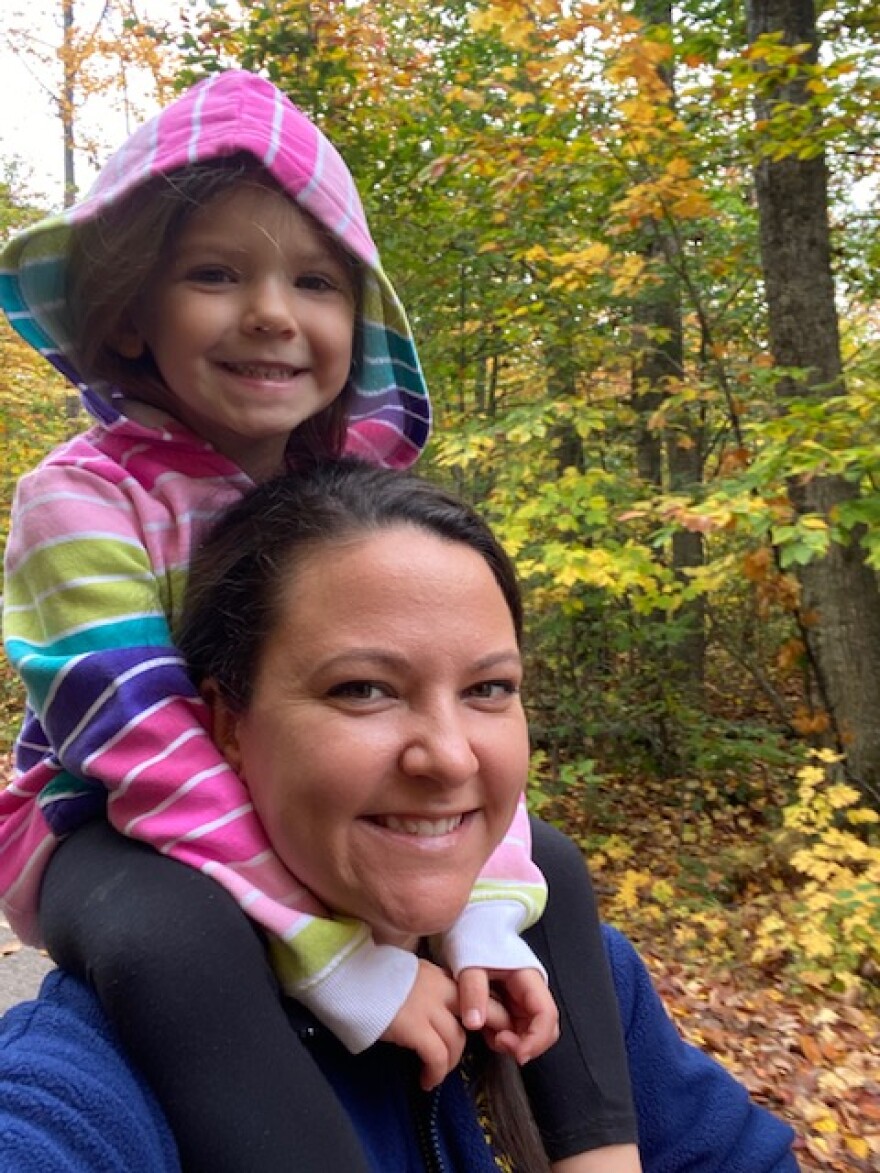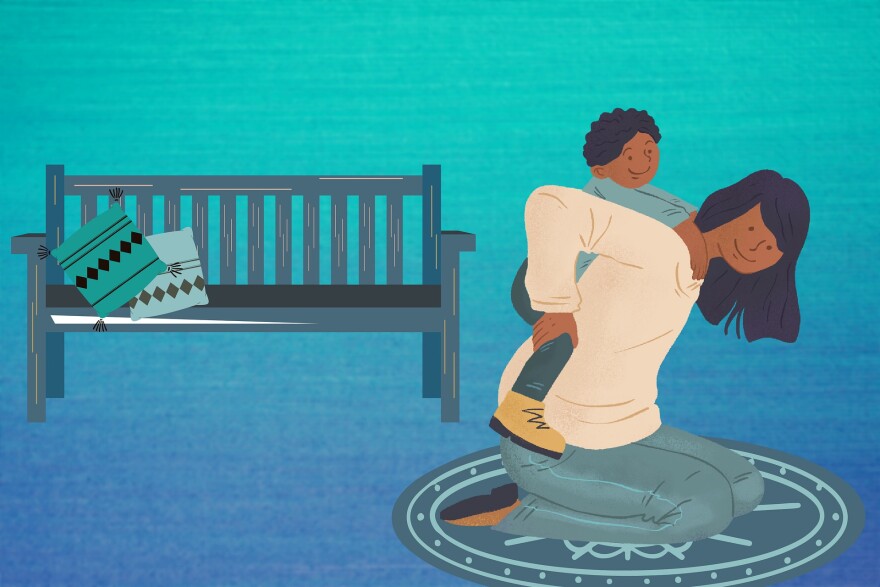The U.S. House is expected to vote later this month to extend a major anti-poverty initiative for one more year.
The expanded Child Tax Credit is part of the Build Back Better Act, President Biden’s signature social safety net and climate change bill.
But so far it’s proven a challenge to reach some key groups, including people who don’t pay income taxes, or don’t have permanent addresses, or who are undocumented.
But for those families who are getting the payments, we wanted to know: What do those monthly checks mean for the household finances of Michigan families?
What is the expanded Child Tax Credit?
Back in March, Congress passed the American Rescue Plan, a sweeping stimulus package that addresses the economic impacts of COVID-19. The bill included an expansion of the Child Tax Credit that some estimated could cut child poverty by nearly half.
This bolstered Child Tax Credit means that qualifying families receive $3,600 per child under age six and $3,000 per child ages six to 17. And unlike the standard tax credit, this year families were able to get part of their credit upfront, in the form of a monthly payment of up to $300 per child per month.
How is the Child Tax Credit impacting caregivers in Michigan?
For some families, these monthly credits are a game-changer. A study from Poverty Solutions at the University of Michigan found that around 75% of people they surveyed said they use the Child Tax Credit to help pay for bills and other basic living expenses, like rent and food. And 94% said the credit was “very or somewhat useful in helping them make ends meet.”
We spoke with caregivers across the state about how they’ve been using the Child Tax Credit. Here’s what they had to say:
![“Now, I have a little bit of extra room in my budget,” Cobb said about the expanded Child Tax Credit. “[T]hat extra cushion allows us to be able to enjoy life a little bit.” Left to right: Isaiah Cobb, Anita Cobb, Amaria Cobb and Dashaun Davis](https://npr.brightspotcdn.com/dims4/default/1d2dce9/2147483647/strip/true/crop/4032x3024+0+0/resize/880x660!/quality/90/?url=http%3A%2F%2Fnpr-brightspot.s3.amazonaws.com%2F3c%2Ff1%2F4013bac0405fa675474c6ce6963a%2Fcobbs2.jpg)
Anita Cobb, Lansing
Anita Cobb spends a lot of her time working. Outside of her full-time job as an aviation planner, she works part-time at a Menards paint department.
“I make decent money, but it's … not like I'm out here balling or anything,” Cobb said.
So she was excited when the Child Tax Credit started coming in. She has three kids: a seventh, eighth, and ninth grader. She said the older that they get, the more expensive they are.
“Now, I have a little bit of extra room in my budget, so I can still make sure I'm saving and whatnot,” Cobb said. “But that extra cushion allows us to be able to enjoy life a little bit.”
She said the first check from the expanded Child Tax Credit went right to savings. But eventually, she started using the credit for her kids’ school clothes, and a couple of fun things for them, too.
“There's a lot of people who are on that bubble where you make just enough to be able to get by, but you don't qualify for assistance,” Cobb said. “It's just the situation that you're in: where you're fortunate, but unfortunate at the same time. So, you know, I advocate for [the government] really looking at the middle class … to see what they could do to really help families stay above water.”
![“Now, I have a little bit of extra room in my budget,” Cobb said about the expanded Child Tax Credit. “[T]hat extra cushion allows us to be able to enjoy life a little bit.” Left to right: Isaiah Cobb, Anita Cobb, Amaria Cobb and Dashaun Davis](https://npr.brightspotcdn.com/dims4/default/129494f/2147483647/strip/true/crop/3024x3024+504+0/resize/200x200!/quality/90/?url=http%3A%2F%2Fnpr-brightspot.s3.amazonaws.com%2F3c%2Ff1%2F4013bac0405fa675474c6ce6963a%2Fcobbs2.jpg)

Christie Donn, Redford
Christie Donn thought she was living the American Dream. She got married, bought a house, bought a car, got a dog — she thought she was doing everything right. But her finances quickly changed after her first kid was born.
Her daughter had a medical emergency and it really strained their finances.
“It got to the point where it was actually more expensive for me to continue working,” Donn said. “So we became a one-income family.”
The Child Tax Credit could not have come at a better time. This past year, Donn’s family has dealt with several expensive emergencies: pet surgery, medical bills, car bills, and a major issue with the foundation of their house.
“[The credit’s] made a huge difference for us every single month that we've received it, “ Donn said.
She says the expanded Child Tax Credit alleviates some of her stress.
“We already live day to day with the fear of living paycheck-to-paycheck,” Donn said. “And something as simple as a $500 check from the government that comes from the taxes we already pay — that alleviates so much pressure, that alleviates so much of that anxiety and that fear that I can take my kids to McDonald's occasionally…. Because you know what? I have ten dollars in my pocket.”


Catherine Hadley, Ann Arbor
Catherine Hadley, a mother of two, says being a student parent at the University of Michigan is great.
“My kids really help keep me motivated,” Hadley said. “Like, for instance, whenever we drive by the big stadium, they think the Big M is for mama. So it sets me to a high standard of work.”
Financially, though, things haven’t been easy. Over the course of the pandemic, Hadley and her husband racked up credit card debt to make ends meet. For Hadley, the Child Tax Credit has meant paying off some of that debt and covering last-minute child care.
Her classes are in-person now, which means when her kids’ school closes, she needs to hire a babysitter. As a student parent, having dependable child care is crucial.
“The biggest thing is if I don't have sustainable care, I can't truly focus on my classes,” she said. “I can't be focused in on World Politics160…. I'm a mother. I have to worry about their safety.”
Hadley staunchly believes that it’s essential to continue the Child tax Credit. But she also thinks we need to do more.
“I think unfortunately, we spent decades just stripping away any support and care across the spectrum,” she said. “And now we're dealing with the fallout of that, and people are scared and upset and have lived through so much. And to have people like, you know, the senators working against this, it's like, how dare you? We, we just survived something impossible. We were providing child care and balancing our jobs and doing the best that we can, and we need this support.”
Hadley has dreams of pursuing a PhD. And she has a long-term goal of researching issues around food stamps and maternal health and then working with the government to help make better policies.
“If we have things like the child tax credit, I can do that. If not, who knows?” Hadley said. “I think the parent voice is really important in here, because often people talk for us and those people talking for us usually don't know the solutions that we actually need.”


Liz Londo, Muskegon
Liz Londo says she's a professional volunteer. She’s active in her community and she’s actually about to start helping eligible parents file their taxes so they can get the Child Tax Credit. She has three kids, ages ten, seven, and four.
Londo’s family is able to get by financially without the Child Tax Credit, but every penny of the credit is going towards her
kids.
“The credit has been very useful for our family because my four-year-old goes to a private preschool and it has completely paid for her tuition to go monthly,” Londo said. “If it does get cut off, I'm just going to have to pick up a side hustle and just pay for it that way.”
Londo says she’s seen some misperceptions about the Child Tax Credit.
“I know I've read people saying, like, ‘Oh, it's just parents, they're going to be able to go get their nails done or, you know, they're going to be able to go out to dinner or more,’” she said. “And it's not the case. I'm not going out to dinner. I'm paying for my child's tuition for school.”
Londo says she hopes the credit will continue — not only for her sake, but for the sake of families who were hit even harder by the economic impacts of COVID-19.


Jacob Pinney-Johnson, Kalamazoo
Jacob Pinney-Johnson thinks a lot about issues of fatherhood. He co-runs the Fatherhood Network, a group that offers one-on-one support and resources to fathers in Kalamazoo County.
Pinney-Johnson is a single dad who co-parents his two kids along with their mom. The expanded Child Tax Credit has been really helpful to him so far. He’s used it to pay for things like bills, food, and recently winter clothes for the kids.
But he says there’s an added layer of complication when it comes to the Child Tax Credit.
“I'm not sure how much thought went into: How do we support co-parents where children may be living in both homes an equal amount of time?,” said Pinney-Johnson. “And how do we do that where it doesn't necessarily put all the burden on co-parents to figure out how we split this money in an equitable way?”
Pinney-Johnson and his former partner decided to split the credit. They use an app to divide the money . But he says it’s not always as simple for other co-parents.
“I totally realize doing fatherhood support work that this idea of Child Tax Credit … can be a huge point of anger and arguments,” he said.
Overall he sees the credit as a tool that can help families build towards financial stability. And even though he’s grateful for the credit, he questions why it took so long for something like this to happen.
“Why did it take the whole pandemic for folks to say, ‘Oh man, we should probably make sure that, you know, all parents in our nation have the basic needs to take care of their children?’”











